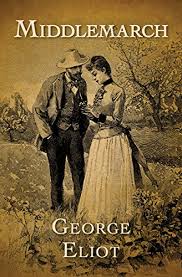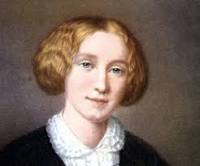Middlemarch Page #18
Middlemarch, A Study of Provincial Life is a novel by the English author George Eliot, appearing in eight instalments in 1871 and 1872. Set in a fictitious Midlands town from 1829 to 1832, it follows distinct, intersecting stories with many characters.
“However,” said Mrs. Cadwallader, first to herself and afterwards to her husband, “I throw her over: there was a chance, if she had married Sir James, of her becoming a sane, sensible woman. He would never have contradicted her, and when a woman is not contradicted, she has no motive for obstinacy in her absurdities. But now I wish her joy of her hair shirt.” It followed that Mrs. Cadwallader must decide on another match for Sir James, and having made up her mind that it was to be the younger Miss Brooke, there could not have been a more skilful move towards the success of her plan than her hint to the baronet that he had made an impression on Celia’s heart. For he was not one of those gentlemen who languish after the unattainable Sappho’s apple that laughs from the topmost bough—the charms which “Smile like the knot of cowslips on the cliff, Not to be come at by the willing hand.” He had no sonnets to write, and it could not strike him agreeably that he was not an object of preference to the woman whom he had preferred. Already the knowledge that Dorothea had chosen Mr. Casaubon had bruised his attachment and relaxed its hold. Although Sir James was a sportsman, he had some other feelings towards women than towards grouse and foxes, and did not regard his future wife in the light of prey, valuable chiefly for the excitements of the chase. Neither was he so well acquainted with the habits of primitive races as to feel that an ideal combat for her, tomahawk in hand, so to speak, was necessary to the historical continuity of the marriage-tie. On the contrary, having the amiable vanity which knits us to those who are fond of us, and disinclines us to those who are indifferent, and also a good grateful nature, the mere idea that a woman had a kindness towards him spun little threads of tenderness from out his heart towards hers. Thus it happened, that after Sir James had ridden rather fast for half an hour in a direction away from Tipton Grange, he slackened his pace, and at last turned into a road which would lead him back by a shorter cut. Various feelings wrought in him the determination after all to go to the Grange to-day as if nothing new had happened. He could not help rejoicing that he had never made the offer and been rejected; mere friendly politeness required that he should call to see Dorothea about the cottages, and now happily Mrs. Cadwallader had prepared him to offer his congratulations, if necessary, without showing too much awkwardness. He really did not like it: giving up Dorothea was very painful to him; but there was something in the resolve to make this visit forthwith and conquer all show of feeling, which was a sort of file-biting and counter-irritant. And without his distinctly recognizing the impulse, there certainly was present in him the sense that Celia would be there, and that he should pay her more attention than he had done before. We mortals, men and women, devour many a disappointment between breakfast and dinner-time; keep back the tears and look a little pale about the lips, and in answer to inquiries say, “Oh, nothing!” Pride helps us; and pride is not a bad thing when it only urges us to hide our own hurts—not to hurt others. CHAPTER VII. “Piacer e popone Vuol la sua stagione.” —Italian Proverb. Mr. Casaubon, as might be expected, spent a great deal of his time at the Grange in these weeks, and the hindrance which courtship occasioned to the progress of his great work—the Key to all Mythologies—naturally made him look forward the more eagerly to the happy termination of courtship. But he had deliberately incurred the hindrance, having made up his mind that it was now time for him to adorn his life with the graces of female companionship, to irradiate the gloom which fatigue was apt to hang over the intervals of studious labor with the play of female fancy, and to secure in this, his culminating age, the solace of female tendance for his declining years. Hence he determined to abandon himself to the stream of feeling, and perhaps was surprised to find what an exceedingly shallow rill it was. As in droughty regions baptism by immersion could only be performed symbolically, Mr. Casaubon found that sprinkling was the utmost approach to a plunge which his stream would afford him; and he concluded that the poets had much exaggerated the force of masculine passion. Nevertheless, he observed with pleasure that Miss Brooke showed an ardent submissive affection which promised to fulfil his most agreeable previsions of marriage. It had once or twice crossed his mind that possibly there was some deficiency in Dorothea to account for the moderation of his abandonment; but he was unable to discern the deficiency, or to figure to himself a woman who would have pleased him better; so that there was clearly no reason to fall back upon but the exaggerations of human tradition. “Could I not be preparing myself now to be more useful?” said Dorothea to him, one morning, early in the time of courtship; “could I not learn to read Latin and Greek aloud to you, as Milton’s daughters did to their father, without understanding what they read?” “I fear that would be wearisome to you,” said Mr. Casaubon, smiling; “and, indeed, if I remember rightly, the young women you have mentioned regarded that exercise in unknown tongues as a ground for rebellion against the poet.” “Yes; but in the first place they were very naughty girls, else they would have been proud to minister to such a father; and in the second place they might have studied privately and taught themselves to understand what they read, and then it would have been interesting. I hope you don’t expect me to be naughty and stupid?” “I expect you to be all that an exquisite young lady can be in every possible relation of life. Certainly it might be a great advantage if you were able to copy the Greek character, and to that end it were well to begin with a little reading.” Dorothea seized this as a precious permission. She would not have asked Mr. Casaubon at once to teach her the languages, dreading of all things to be tiresome instead of helpful; but it was not entirely out of devotion to her future husband that she wished to know Latin and Greek. Those provinces of masculine knowledge seemed to her a standing-ground from which all truth could be seen more truly. As it was, she constantly doubted her own conclusions, because she felt her own ignorance: how could she be confident that one-roomed cottages were not for the glory of God, when men who knew the classics appeared to conciliate indifference to the cottages with zeal for the glory? Perhaps even Hebrew might be necessary—at least the alphabet and a few roots—in order to arrive at the core of things, and judge soundly on the social duties of the Christian. And she had not reached that point of renunciation at which she would have been satisfied with having a wise husband: she wished, poor child, to be wise herself. Miss Brooke was certainly very naive with all her alleged cleverness. Celia, whose mind had never been thought too powerful, saw the emptiness of other people’s pretensions much more readily. To have in general but little feeling, seems to be the only security against feeling too much on any particular occasion.
Translation
Translate and read this book in other languages:
Select another language:
- - Select -
- 简体中文 (Chinese - Simplified)
- 繁體中文 (Chinese - Traditional)
- Español (Spanish)
- Esperanto (Esperanto)
- 日本語 (Japanese)
- Português (Portuguese)
- Deutsch (German)
- العربية (Arabic)
- Français (French)
- Русский (Russian)
- ಕನ್ನಡ (Kannada)
- 한국어 (Korean)
- עברית (Hebrew)
- Gaeilge (Irish)
- Українська (Ukrainian)
- اردو (Urdu)
- Magyar (Hungarian)
- मानक हिन्दी (Hindi)
- Indonesia (Indonesian)
- Italiano (Italian)
- தமிழ் (Tamil)
- Türkçe (Turkish)
- తెలుగు (Telugu)
- ภาษาไทย (Thai)
- Tiếng Việt (Vietnamese)
- Čeština (Czech)
- Polski (Polish)
- Bahasa Indonesia (Indonesian)
- Românește (Romanian)
- Nederlands (Dutch)
- Ελληνικά (Greek)
- Latinum (Latin)
- Svenska (Swedish)
- Dansk (Danish)
- Suomi (Finnish)
- فارسی (Persian)
- ייִדיש (Yiddish)
- հայերեն (Armenian)
- Norsk (Norwegian)
- English (English)
Citation
Use the citation below to add this book to your bibliography:
Style:MLAChicagoAPA
"Middlemarch Books." Literature.com. STANDS4 LLC, 2024. Web. 25 Nov. 2024. <https://www.literature.com/book/middlemarch_242>.




Discuss this Middlemarch book with the community:
Report Comment
We're doing our best to make sure our content is useful, accurate and safe.
If by any chance you spot an inappropriate comment while navigating through our website please use this form to let us know, and we'll take care of it shortly.
Attachment
You need to be logged in to favorite.
Log In